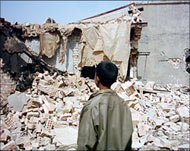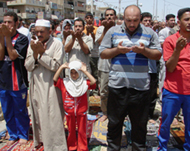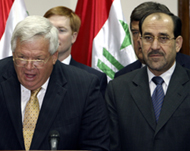Iraq official rejects US killings report
Iraq vowed on Saturday to press on with its own investigation into the deaths of civilians in a US raid on the town of Ishaqi, rejecting the US military’s exoneration of its forces.

Adnan al-Kazimi, an aide to the prime minister, Nuri al-Maliki, said the government would demand an apology from the United States and compensation for the victims in several cases, including the alleged massacre in the town of Haditha last year.
“We have from more than one source that the Ishaqi killings were carried out under questionable circumstances. More than one child was killed. This report was not fair for the Iraqi people and the children who were killed,” al-Kazimi told Reuters.
The US military had issued a statement about Ishaqi saying allegations that US troops “executed a family … and then hid the alleged crimes by directing an air strike, are absolutely false”.
Police in Ishaqi say five children, four women and two men were shot in the head, and that the bodies, with hands bound, were dumped in one room before the house was blown up.
Scepticism
The US military repeatedly has pledged to punish any soldier found guilty of atrocities in Iraq, but the decision to clear the troops in Ishaqi fuelled deep mistrust among ordinary Iraqis three years after the US-led invasion to oust Saddam Hussein.
 |
|
A boy stands outside a destroyed |
“Ishaqi is just another reason why we shouldn’t trust the Americans,” said Abdullah Hussein, an engineer in Baghdad.
“First they lied about the weapons of mass destruction, then there was the Abu Ghraib prison abuse scandal and now it’s clear to the world they were guilty in Haditha,” he told Reuters.
The human rights minister, Wijdan Michael, said her ministry would send a fact-finding commission to Ishaqi in the next few days.
Severed heads
Iraqi police on Saturday found eight severed heads north of Baghdad with a note indicating at least one of the men was killed in retaliation for the slaying of four Shia doctors, authorities told the Associated Press.
Five of the slain men were security guards at a hospital complex in the capital who had been arrested by Iraqi police on Thursday, Lieutenant Colonel Adil Al-Zihari of the Diyala police said.
 |
|
Shias perform the Friday noon |
The heads were found near a highway in the Hadid village near Baquba, 60km (35 miles) northeast of Baghdad, and were transferred in fruit boxes to the morgue in Baquba.
Gunmen also ambushed a police checkpoint in the city on Saturday, killing seven police officers and wounding five pedestrians, police said.
Elsewhere, gunmen opened fire on two people in a car, killing one of them and wounding the other, in the predominantly Sunni Dura neighbourhood in southern Baghdad. One of those killed was a car salesman, Lieutenant Maitham Abdul Razzaq said.
At least four bodies were found across Baghdad on Saturday, including a man in his 40s who was shot to death with his hands and legs bound, then dumped behind a hospital in Sadr City. Two other men who were bound and shot to death, showed signs of torture and were left near a ditch near the Shia slum.
The fourth body, which was shot in the head and showed signs of torture, was found in an intersection in eastern Baghdad.
Talks on minister posts
Meanwhile, the prime minister, Nuri al-Maliki, held last-minute negotiations with Sunni and Shia leaders on the eve of his planned announcement of names for the interior and defence ministers, two weeks after his government of national unity took office.
 |
|
Dennis Hastert (L) assured |
Al-Maliki promised earlier to fill the posts on Sunday, despite failing to reach an agreement on candidates with ethnic and sectarian parties.
The appointments are considered key to his plan to take over the security of Iraq within 18 months.
Al-Maliki told visiting US congressmen on Friday that “we are keen to march in the correct direction to confront these challenges despite the difficulties”.
US House Speaker Dennis Hastert told al-Maliki that “an important next step is for the Iraqi government to seek national reconciliation in order to end the insurgency and disband the sectarian militias”.